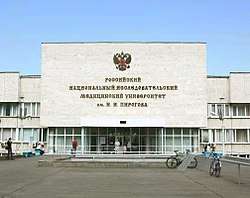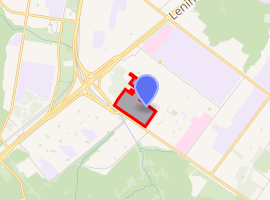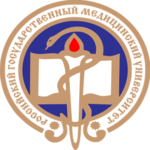Russian National Research Medical University
Pirogov Russian National Research Medical University (formerly known as Russian State Medical University or RSMU) is a medical education institute in Moscow, Russia founded in 1906. It is fully accredited and recognized by Russia's Ministry of Education and Science and is currently under the authority of the Ministry of Health and Social Development.[1]
N.I. Pirogov | |
 | |
Former names | 2nd Moscow State Medical University, Russian State Medical University |
|---|---|
| Type | Public university |
| Established | 1906 |
| Address | Ostrovityanova Street, 117997 Moscow , , 55°38′50″N 37°29′25″E |
| Website | www |
Building details | |
 University entrance | |

| |
Named after Russian surgeon and pedagogue N.I. Pirogov (1810-1888), it is one of the largest medical institutions and the first university in Russia to allow women to acquire degrees .
It is especially notable in comparison to Moscow's other two premier medical universities in that it focuses on gearing students for careers in medical and scientific research, rather than medical practice.

History
| Name of the institute in different years |
|---|
|
The first ever lecture was delivered on September 26, 1906). The course was at that time called HMCW (Higher Medical Course for Women). The course listeners were called "medichki". The first "medichki" graduation was in spring 1912.
Due to the popularity of the course, the entrance competition was very high. In 1906, the medical faculty students numbered 206 and in 1907-1908 there were 285. Therewith, 2128 applicants for study were rejected. So, the entrance competition equaled almost 9 people for one position.
Since the establishment of the HMCW medical department up to the February Revolution of 1917, a total of 1060 students were trained there.
The revolutionary events of 1917 gave an incentive to a new wave in the history of HMCW. The "Interim Government Herald" (Vestnik Vremennogo Pravitelstva) informed about the legislation of the draft for the transformation of women courses into women universities. However no practical implementation of the legislation followed. On top of that, the study years 1917-1918 started off with huge complications and in November the studies were dismissed. On October 16, 1918 the People's Commisariat Board decreed to transform HMCW into 2nd Moscow State University (2nd MSU), thus becoming a new educational establishment of mixed character without considering the former a separate educational establishment.
2nd MSU existed up to 1930. Later on, as a result of reorganization 3 independent institutes came to existence including 2nd Moscow State Medical Institute (2nd MSMI). Then a period of progressive development started and lasted till the World War. This includes the formation of new departments and faculties. Each department had a scientific student society of its own. During the early days of war, when the state examinations were over after spring, practically all the graduates were sent to the Red Army Forces. Throughout all the years of war, the institute operated as usual and kept on training specialists. On November 23, 1946 on account of 40 years of its foundation, the USSR Presidium of the Supreme Soviet decree decided to honour the institute with the name of I.V. Stalin. From that year onwards up to 1957, the institute was officially called "2nd MSMI named after I.V. Stalin".
And on May 30, 1957 as a dedication to its 50th year of foundation, the RSFSR Presidium of the Supreme Soviet decree honoured 2nd MSMI with the name of Russian surgeon and anatomist N.I. Pirogov. In 1966, on its 60th anniversary, the institute was awarded with Order of Lenin and acquired a new name which was 2nd MOLSMI named after N.I. Pirogov.
Ratings
In 2014, the Russian rating agency "Expert RA" included it in its list of rated universities of higher educational of the Commonwealth of Independent States, assigning it a rating of "D".[3][4]
Courses
Undergraduate
- General Medicine: 6 years
- Pediatrics: 6 years
- Medical Biochemistry: 6 years
- Medical Biophysics: 6 years
- Medical Cybernetics: 6 years
- Dentistry: 5 years
- Pharmacy: 5 years
- Clinical Psychology: 5 years
- Social Work: 5 years
Clinical residency
- Obstetrics and Gynecology
- Dermatovenereology
- Ultrasonic diagnosis
- Plastic surgery
- Urology
- Allergology and immunology
- Anesthesiology and critical care medicine
- Hematology
- Pediatric endocrinology
- Cytology
- Neuroscience
- Neonatology
- Oncology
- ENT
- Ophthalmology
- Psychiatry and Addiction Medicine
- Forensic Pathology
- Gastroenterology
- Medical Genetics
- Family Medicine
- Pathology
- Psychiatry
- Psychotherapy
- Pulmonology
- Rheumatology
- Public Health
- Physical Therapy and Rehabilitation
- Pediatric surgery
- Endoscopic Surgery
- General Surgery
- Dental and Maxillofacial surgery
- Infectious diseases
- Cardiology
- Clinical pathology
- Clinical pharmacology
- Pediatrics
- Radiology
- Radiation oncology
- Internal Medicine
- Cardiovascular surgery
- Trauma and Orthopedic Surgery
- Endocrinology
- Clinical Physiology
Clinical Fellowships, Research, Teaching and Postdoctoral Positions
- Obstetrics and Gynaecology
- Anesthesiology and Critical Care Medicine
- ENT
- Internal medicine
- Gastroenterology
- Hematology
- Ophthalmology
- Pediatric surgery
- Dentistry
- Urology
- Trauma and Orthopedic Surgery
- Clinical Physiology
- General Surgery
- Infectious diseases
- Cardiology
- Clinical Immunology and Allergy
- Clinical pathology
- Dermatology and STDs
- Radiology
- Neurology
- Public health
- Medical Oncology
- Pathology
- Pediatrics
- Psychiatry and Addiction Medicine
- Pulmonology
- Rheumatology
- Cardiovascular Surgery
- Forensic Pathology
- Toxicology
- Clinical Pharmacology
- Endocrinology
- Sports medicine
- Physical Therapy and Rehabilitation
- Clinical Biochemistry
- Biology
Clinical internship training
- Internal Medicine
- Emergency Medicine
- Anesthesiology and Critical Care Medicine
- Obstetrics and Gynaecology
- Psychiatry
- General Surgery
- Paediatrics
- Radiology
- Dermatology and STDs
- Forensic Pathology
- Infectious diseases
- Pathology
- Neurology
- Neonatology
- Oncology
- Ophthalmology
- ENT
- Paediatric surgery
- Trauma and Orthopedic Surgery
- Public health
- Pulmonary Medicine
Administration
Academic Council
Superior Authority of Russian National Research Medical University is the Academic Council. The term of office of the Academic Council is for 5 years. Following the principles of transparency (Glasnost), it allows broad discussion and sharing of information about the development prospect of the university with public address.
Rectorate
Rectorate is the executive authority of the University. At its head is the Rector, and the structure of administration also includes five vice-chancellors, two vice-rector for Academic Affairs, Vice-Rector, Vice Rector for Clinical Work, and Vice President for Quartermaster.
Rectors
- Vladimir Guerrier, 1872–1888, 1900–1905[5]
- Sergey Chaplygin, 1905–1919
- Sergey Namyotkin, 1919–1924
- Albert Pinkevich, 1924–1930
- Eugene Tsukershteyn, 1930–1931
- Joseph Rybak, 1932–1936
- Love Basias, 1937
- Abraham Cot, 1937–1946
- Sergei Milovidov, 1946–1956
- Oleg Kerbikov, 1956–1958
- Maria Sirotkin, 1958–1964
- Yuri Lopukhin, 1965–1984
- Vladimir Yarygin, 1984–2007
- Nikolai Volodin, 2007–2011
- Natalia Polunin, 2011–2012
- Andrei Kamkin, 2013–2015
- Sergey Lukyanov, 2015–
Notable alumni
- Leonid Roshal - professor, MD, director of the Moscow Institute of Children's Emergency Surgery and Traumatology,[6] member of Public Chamber of Russia, expert of the World Health Organization, Member of the Commission on Human Rights under President of Russian Federation, "Doctors of the World", "European of the Year" "Russian of the Year", "Star of Europe 2005", the president of the National Medical Chamber of Russia
- Vera Sidelnikov - professor, Doctor of Medical Sciences, Honored Scientist of Russia, laureate of the Russian Federation Government, the premium LS Persianinova
- Yakob D. Kahn - professor of Urology in Moscow Medical Stomatological Institute, MD
- Michael Kechker - Soviet and Russian physician, cardiologist, MD, professor, academician of the Russian Academy of Medical and Technical Sciences, Honoured Doctor of the Russian Federation
- Georgy Znamensky (1903-1946) - Soviet athlete and prize winner of the USSR, Honored Master of Sports (1936), member of the CPSU (b) since 1941
- Serafim Ivanovich Znamensky (1906-1942) - Soviet athlete and prize winner of the USSR. Honored Master of Sports (1936)
References
- http://en.russia.edu.ru/idbv/#id=1334
- http://rsmu.ru/65.html
- Составлен свежий рейтинг ВУЗов России и стран СНГ (translated)
- http://raexpert.ru/rankings/vuz/vuz_sng/part2/&usg=ALkJrhhMDYi_9wyLBCOtmmK8gGwshpoN9Q (translated)
- http://rsmu.ru/609.html
- http://www.doctor-roshal.ru/
External links
- Official website (in Russian)
- English version of the official website (Limited Content) (in English)
- Listing in the Database of Ministry of Science and Education of the Russian Federation